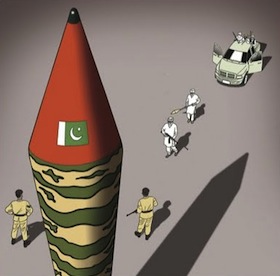Concern Grows as Pakistan Expands Nuclear Arsenal
May 16, 2011
Featured Image
Today's top nuclear policy stories, with excerpts in bullet form.
Stories we're following today - Monday May 16, 2011.
Pakistan Builds Low Yield Nuclear Capability, Concern Grows - Sanjeev Miglani in Reuters [link]
- Pakistan's successful test of a missile able to carry short range nuclear weapons threatens to raise tensions in a region already nervous that the death of Osama bin Laden will create more instability.
- Tactical nuclear weapons, as these are called, are often seen as more dangerous than the traditional strategic weapons because their small size and vulnerability to misuse. Theft makes them a risk to global security.
- "Pakistan's development and testing of nuclear-capable short-range missiles is a destabilizing and potentially dangerous development," Daryl G. Kimball, the executive director of the Washington-based Arms Control Association, said.
Pakistan’s Nuclear Surge - Andrew Bast in Newsweek [link]
- At a moment of unprecedented misgiving between Washington and Islamabad, new evidence suggests that Pakistan’s nuclear program is barreling ahead at a furious clip.
- “We’ve looked the other way from Pakistan’s growing [nuclear] program for 30 years,” says Sharon Squassoni, a director at the Center for Strategic and International Studies. What we’re facing, she says, is “a disaster waiting to happen.”
Lawmakers Hope to Force Iran's Hand on Nukes - Associated Press
- Iran could face a new array of U.S. sanctions under proposed House legislation that's meant to force Tehran into international talks on its nuclear program.
- Rep. Ileana Ros-Lehtinen...and Rep. Howard Berman have introduced a bill that would impose penalties on human rights abusers in Iran, including freezing their U.S.-based assets, denying them visas and prohibiting financial or business transactions with any U.S. entity.
- The round of sanctions also would target foreign companies that do energy business with Iran's Revolutionary Guard; expand help to pro-democracy groups in Iran; and require all companies...that are registered with the Securities and Exchange Commission to report on whether they are conducting activities with Iran that could trigger sanctions.
I Saved My Country from Nuclear Blackmail - A. Q. Khan in Newsweek [link]
- I would like to make it clear that it was an Indian nuclear explosion in May 1974 that prompted our nuclear program, motivating me to return to Pakistan to help create a credible nuclear deterrent and save my country from Indian nuclear blackmail.
- India and Pakistan understand the old principle that ensured peace in the Cold War: mutually assured destruction. The two can’t afford a nuclear war, and despite our saber rattling, there is no chance of a nuclear war that would send us both back to the Stone Age.
- Our nuclear-weapons program has given us an impregnable defense, and we are forced to maintain this deterrence until our differences with India are resolved.
Inevitable and Unpredictable Regime Change in Iran - Paul Pillar in The National Interest [link]
- The collapse of the regime is both inevitable and unpredictable...each of the dimensions that underlay the ouster of leaders in Egypt and Tunisia—corruption, repression, and economic malaise—Iran is in even worse shape than those two Arab states were.
- Given that there will not be predictions any more precise or reliable than for the political changes associated with the Arab Spring, the United States will need a policy that is not based on any such prediction but instead will be sound regardless of the future of the current regime…it would be a mistake to put relations with Iran on ice in an effort to outlast that regime.
- Because the Iranian regime eventually will fall because of its own internal weaknesses and contradictions, U.S. policy toward Iran should not be looked at primarily as an instrument of instigating regime change.
Beware Decline in Pakistani Relations - Toby Dalton and George Perkovich in Politico [link]
- The nuclear issue looks different from Pakistan. For most of the world, the question is, can terrorists steal the nuclear weapons? In Islamabad it’s, can the United States or India steal them?
- This paranoia is unfounded — killing one person in a stealthy raid is a far different proposition than capturing nuclear weapons and material in multiple, heavily guarded facilities. But even the perception worries Pakistan’s generals, which is detrimental to the U.S.-Pakistan relationship.
- It is impossible to build a strategic relationship when one partner can’t be trusted to prevent nuclear terrorism and the other can’t be trusted not to exploit its intelligence and military presence to steal or destroy the other’s nuclear deterrent.

